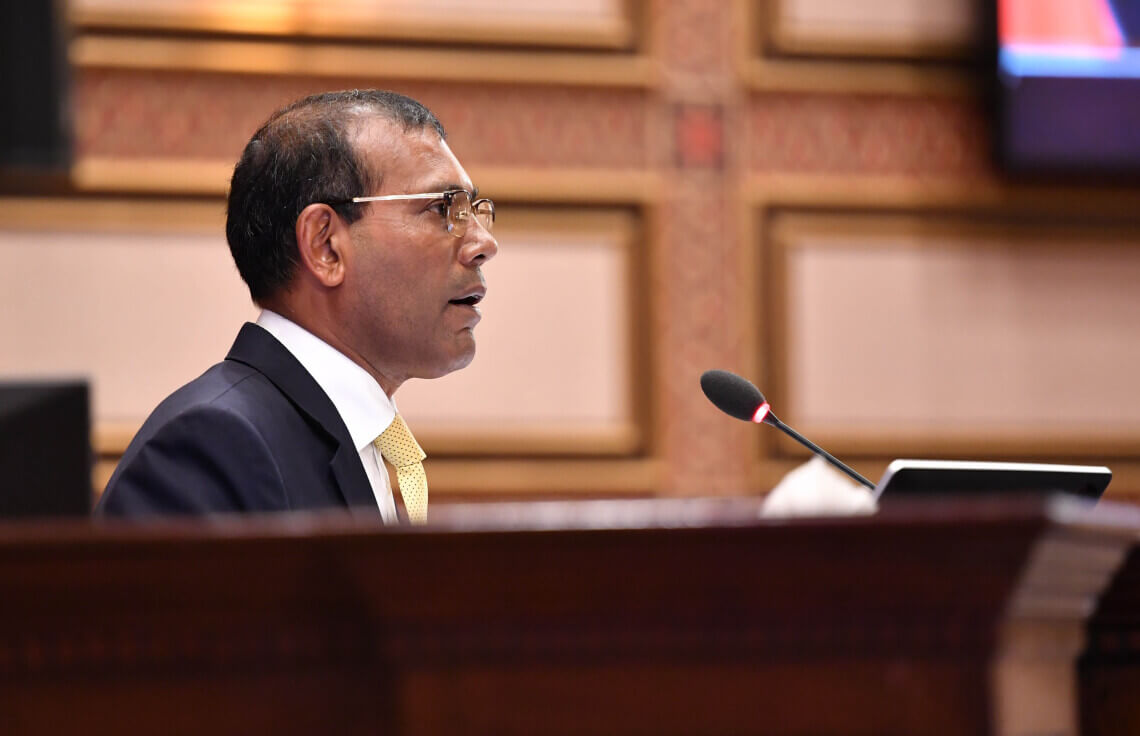Maldivian parliamentary speaker Mohamed Nasheed remarked that while the $100 million assistance package from India is a “huge help”, it merely offers a “temporary solution” to the country’s foreign reserve crisis.
Indian Ambassador Munu Mahawar on Tuesday presented the symbolic cheque to Maldivian Finance Minister Ibrahim Ameer and Foreign Minister Abdulla Shahid, who said the assistance is further evidence of the two countries’ historical ties and of India’s continued support for the economic and infrastructural development of the island nation.
The $100 million will be issued in the form of treasury bonds from the State Bank of India’s Malé branch. It comes in pursuance of an agreement between Maldivian President Ibrahim Solih and Indian Prime Minister (PM) Narendra Modi signed during Solih’s four-day visit to India in August.
Treasury bonds are sold by countries as short-term investment instruments for budgetary support, where the interest rates rise according to the maturity date.
India sarukaarun Raajjeyge budget support ah dhin $100M ge loan akee mivaguthah libunu varah bodu eheetherikameh. Nethemun dhiya beyru faisaage reserve ah libunu vaguthee halleh. Shukuriyya India.🇲🇻 🇮🇳@PMOIndia, @HCIMaldives
— Mohamed Nasheed (@MohamedNasheed) November 29, 2022
Opposition lawmaker Ali Hussain has expressed concern about the government undermining the country’s independence via such loans, as it may propel the Maldives into a cycle of debt.
In fact, the Finance Ministry estimates that the Maldives’ total debt will surge to MVR 105.7 billion ($6.9 billion) by the end of 2022, of which MVR 35.4 billion ($2.3 billion) is through externally acquired loans. It also projects that the country’s debt could soar to MVR 113.7 billion ($7.4 billion) by 2023.
The Maldives Journal, an opposition-backed local newspaper, reported that President Solih has significantly increased the national debt by securing funding from India, which has accepted requests to grant over $1 billion in assistance in return for establishing its military presence in the Maldives.
India Out Campaign based on "misinformation & false propaganda", says Indian High commissioner to Maldives @HCIMaldives @AmbMunu pic.twitter.com/4IxkxLBX5o
— Sidhant Sibal (@sidhant) August 2, 2022
Much of this criticism is rooted in the “India Out” campaign, first launched in 2018 to criticise the government’s decision to sign “secret agreements” with India and allow it to establish military bases in the Maldives.
Meanwhile, the Maldives has received over $2 billion in financial assistance from India, including the recent $400 million Line of Credit from India’s Exim Bank, a $100 million grant from the Indian government for the Greater Male Connectivity Project, and an additional $100 million Line of Credit for infrastructure development.
In June, India also agreed to sell 520 tonnes of sugar to the Maldives under a special permit until 2024. Similarly, in May, Maldivian Foreign Minister Abdulla Shahid said the country would import Indian wheat under a special permit, despite India announcing a wheat export ban. In fact, trade between the two countries grew by 31% last year.
Furthermore, it has received defence and security equipment and funding to build security infrastructure, such as police stations. The two countries also collaborate on cybersecurity and disaster management.
In turn, the Maldives has emphasised its commitment to an ‘India First’ foreign policy and has pushed back against domestic criticism of India’s security presence in the country. as well as criticism of India in international forums such as the Organisation of Islamic Countries.
President Solih holds official talks with Indian Prime Minister Narendra Modi https://t.co/wxu9TgIbzI
— The President's Office (@presidencymv) August 2, 2022
The government has rejected the “India Out” campaign’s allegations as “misguided” and “unsubstantiated” attempts by the opposition to “spread false information” about its ties with India, hailing it as the Maldives’ “closest ally and trusted neighbour.”
Former President Abdulla Yameen called on the government to hold a referendum to seek public approval for the Indian military’s continued presence on the island nation in December last year.
Apart from concerns about the Indian military’s presence in the Maldives, the opposition is also concerned about Solih’s pro-India policy as his decision to distance himself from China.
In recent years, India’s engagement with the Maldives has centred around countering China’s expanding influence.

